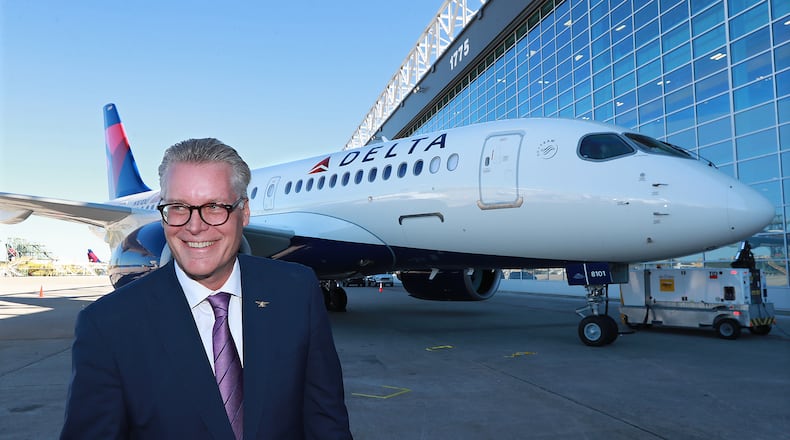Delta Air Lines CEO Ed Bastian took a pay cut last year, but still received stock incentives and options before restrictions on executive compensation tied to federal stimulus funding took effect.
Bastian’s total compensation amounted to $13.1 million in 2020, including a salary of $237,500, stock awards of $8.4 million and option awards of $4.1 million, along with other compensation, according to a filing with the U.S. Securities and Exchange Commission on Friday afternoon.
That was down from $17.3 million in total compensation in 2019, mostly due to the elimination of a cash incentive bonus.
The drop came after Atlanta-based Delta lost a record $12.4 billion in 2020 as air travel plummeted 60% due to the COVID-19 pandemic. The airline also cut the number of employees from 90,000 to 75,000 through buyouts and early retirements, not counting tens of thousands of workers who took unpaid leave last year.
Many workers took cuts in hours and total pay of around 25%. Delta also didn’t pay profit-sharing bonuses to rank-and-file employees last year after it disbursed a record $1.6 billion in such payments in 2019, equivalent to about two months of pay for the average worker. More than a third of Delta’s employees are based in Georgia.
Other Delta executive officers also saw their compensation drop, including a 50% salary cut during the pandemic and the elimination of cash bonuses. Delta did pay out bonuses earlier this year to managers, directors and senior vice presidents below the executive officer level, ranging from thousands of dollars to hundreds of thousands of dollars. The company called it a “one-time adjustment” to bring most employees’ pay cuts to a similar 20-30% level.
Bastian’s salary last year was down 75% from the $945,833 he received in 2019 after he declined to take a salary from April 2020 until the end of the year. Salary typically makes up only a small portion of a CEO’s overall financial compensation at large publicly traded companies.
The value of Bastian’s stock and option awards is based on the stock price in early February 2020, when the stock awards were made under a typical annual schedule.
The limits on executive compensation tied to federal CARES Act funding for airlines last year did not take effect until March 24, 2020. Delta received $5.6 billion in federal aid last year.
Delta included in its filing with the U.S. Securities and Exchange Commission a chart showing that by the end of 2020, the stocks were worth far less, at $4.9 million, while the options were below the exercise price and not worth anything at that time.
However, Delta’s stock price has since climbed from $40.21 on Dec. 31, 2020 to closer to $47 Friday. That makes the stocks worth more, though the current stock price is still below the option exercise price of $58.89. Delta shares closed as low as $19.19 on May 15, 2020, about two months into the pandemic.
The American Rescue Plan passed in March 2021 extended executive compensation limits for airlines that receive the funding until April 1, 2023.
Delta’s filing with the SEC on Friday said the board’s compensation committee declined to adjust the 2020 long-term incentive plan awards “despite the likelihood that the officers may never receive their intended value.”
But Delta said in a December SEC filing that its board of directors’ compensation committee had approved a new management incentive plan for “cash incentive award opportunities beginning Jan. 1, 2021.” It said the plan would not pay out more than the “target award level” to managers if other employees do not get profit-sharing bonuses.
Chief Information Officer Rahul Samant received a $300,000 bonus on top of his salary of $343,750 last year after the airline engineered a massive shift to work from home for many white-collar workers.
About the Author
The Latest
Featured



